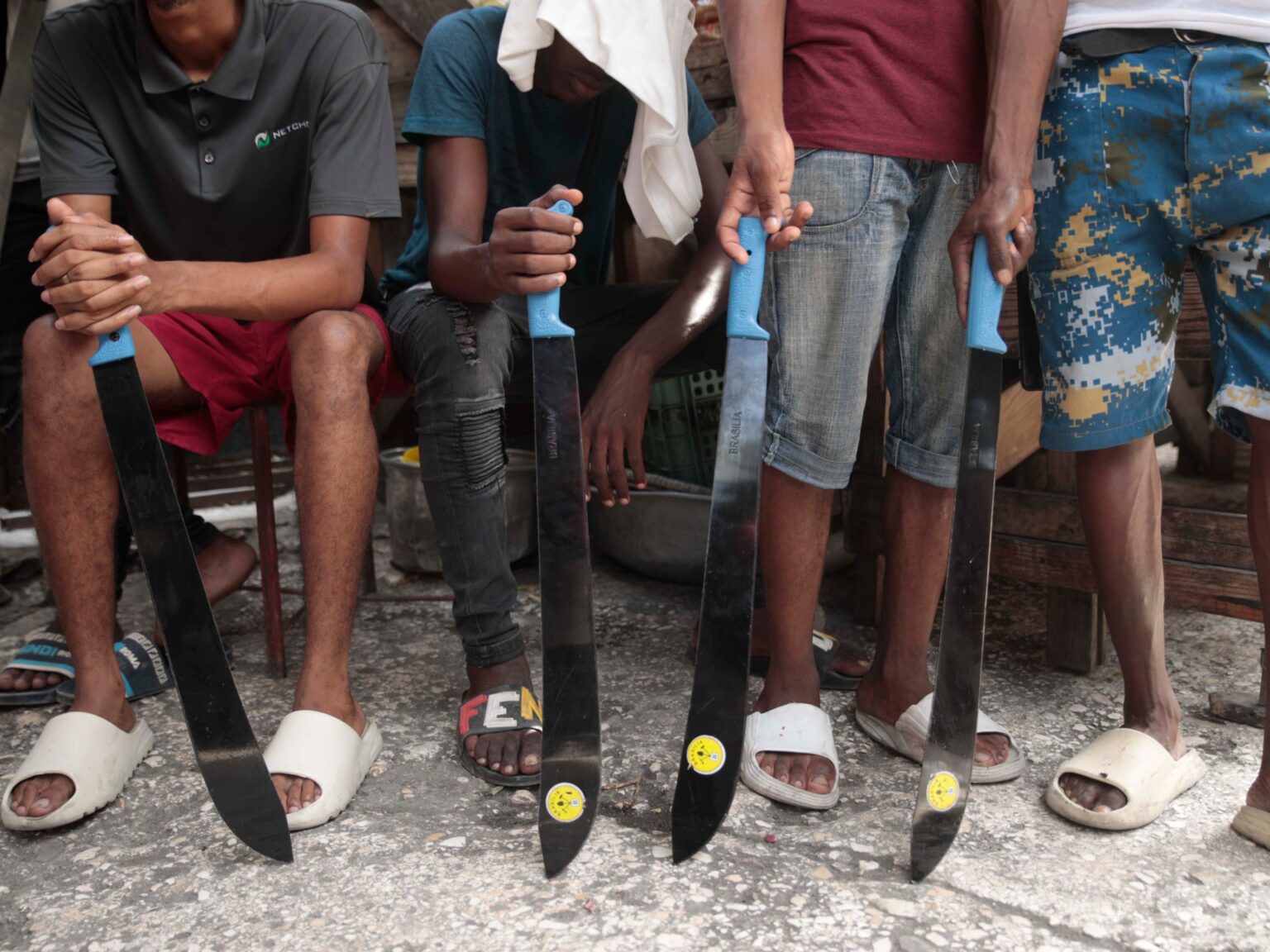Global Courant
Gedeon Jean describes it as a “collective awakening”.
In recent weeks, groups of Haitian civilians, armed with machetes, sticks and other improvised weapons, have banded together to root out suspected gang members and end the killings, rapes and kidnappings that are destroying their communities.
The rights group Center d’analyse et de recherche en droits de l’homme (CARDH) that Jean leads said suspects have been “pursued, beaten, beheaded and then burned alive” by members of the vigilante movement – dubbed “Bwa Kale”, or “peeled wood” in Haitian Creole.
At least 160 suspected gang members were murdered between April 24 and May 24, according to CARDH a report this month, and as a result, Haiti has seen a “drastic decrease” in kidnappings, murders and other forms of violence linked to the armed groups.
However, Jean said that while the movement has had “significant” effects, it does not provide a long-term solution to the violence gripping the Caribbean nation of about 12 million people. Instead, he said Haitian state institutions must be strengthened and take responsibility for protecting civilians.
“We are in a situation where the population has to defend itself,” Jean, executive director of CARDH, told Al Jazeera in a telephone interview. “Bwa Kale is symptomatic of the collapse of the state,” he said.
“Citizens cannot really protect themselves… It is the role of the institutions, of the police, of the state – to take steps so that (they) can exercise their mandate.”
Escalating violence
The Bwa Kale movement formally started on April 24, when mob lynched more than a dozen suspected gang members and set their bodies on fire in the streets of Canape Vert, a neighborhood in the capital Port-au-Prince.
In a brief statement posted on Facebook that day, the Haitian National Police (PNH) said officers seized weapons from “armed individuals” traveling in a minivan. “More than a dozen individuals traveling in this vehicle were unfortunately lynched by members of the public,” police said.
Images shared online and by international news agencies showed a crowd of people standing by a pile of charred human remains.
The lynching came after nearly two years of escalating violence in Port-au-Prince and other parts of Haiti, where armed groups are vying for power in the political vacuum created by the July 2021 assassination of former President Jovenel Moise.
Haiti’s de facto leader, Prime Minister Ariel Henry, who elected Moise to the post just days before he was assassinated, has faced a crisis of legitimacy — and attempts to chart a political transition for the country have failed.
Haitian state institutions are largely dysfunctional, the PNH is underfunded and under-resourced, and rights groups have denounced authorities for not holding gang members and their backers accountable for the rising violence.
Against that background, Bwa Kale did not emerge as an organized movement, but rather as a “spontaneous” action of residents going around, “looking for known gang members” and killing them, said Louis-Henri Mars, executive director of Lakou Lape, a peacebuilding group in Port-au-Prince.
Mars warned that the spate of vigilante killings could potentially trap people who aren’t involved in gangs, or serve as a means for people to retaliate for unrelated slurs. Nor is it a long-term solution, he said.
But Mars told Al Jazeera it’s hard to blame the population for “taking matters into their own hands” because Haitian authorities have failed to protect them. “It is a testimony to the ineffectiveness of the (police) and the ineffectiveness of the government in subduing the gangs,” he said.
History of vigilance
Nor is this the first time vigilance has gripped Haiti.
After the brutal rule of former Haitian President Francois “Papa Doc” Duvalier and his son, Jean-Claude “Baby Doc” Duvalier, ended in 1986, Haitians sought to rid the nation of all signs of Duvalierism in a process known as “dechoukaj”. – literally, uproot.
The period of political and social change included lynchings of suspected Duvalier supporters and members of the duo’s widely feared Tonton Macoute paramilitary brigade, which killed and tortured thousands of people during the combined 29-year dictatorship of the Duvaliers.
“In addition to advocating political change, some Haitians periodically attacked suspected ‘Macoutes’ and in some cases hacked to death their alleged former persecutors,” Human Rights Watch wrote in a 1996 report marking a decade since the formal end of duvalierism.
The rights group said the “frustration of the Haitian people over the historic corruption of the judiciary and complicity with the military” had fueled further incidents of vigilante violence, including “public allegations of robbery, after which gangs rushed in and beat the accused to death”.
Danielle Jung, an associate professor of political science at Emory University in the United States and co-author of the book Lynching and Local Justice: Legitimacy and Accountability in Weak States, said collective vigilance is more likely to emerge in places with a weak rule of law.
Jung, who researched the practice in Haiti in 2017, told Al Jazeera that a Haitian focus group participant summed it up at the time: “It may not be the best justice, but it’s justice.”
Men with machetes, part of Bwa Kale, walk with their machetes in the Delma district of Port-au-Prince, Haiti, May 28, 2023 (Ariana Cubillos/AP Photo)
While collective vigilance isn’t unique to the Caribbean country — similar movements have sprung up in South Africa, Brazil and elsewhere — Jung said it enjoys relatively high approval and legitimacy in Haiti.
Still, she said creating a robust justice system and strong state institutions that allow community members to achieve justice could disrupt the phenomenon overall and “could be a really important piece of the solution.”
“It is nobody’s first choice. I think (people) would prefer to turn to state institutions and state courts in most of these cases,” Jung said. “But because they feel like they don’t have that option, communities are taking it on.”
Path ahead
Back in Port-au-Prince, Mars said in Lakou Lape that Haitian authorities and society at large need a multifaceted approach to move beyond Bwa Kale and end the cycle of violence.
Building trust in Haitian state institutions will be a critical step, he said, which can only be achieved if authorities take action against all illegal armed groups operating in the country, “not just some”.
Mars said the government should threaten to use “a big stick” but at the same time offer a “planned exit strategy” for gang members, as well as some form of transitional justice for those who have suffered.
“The victims of the gangs, as the population demonstrated with the Bwa Kale movement, are deeply outraged by what they have experienced. They lost loved ones, they had to pay money they didn’t have, they lost homes,” he said.
The state needs to strengthen its presence and establish programs to address the underlying issues underlying the violence, including poverty and unemployment, Mars said. Relations between armed groups and some politicians and business people also need to be addressed.
“People know that the population in the neighborhoods is fed up with the situation, but the tendency is often that this awareness comes to the fore and for some reason the movement slows down or dies, and people go back to business as usual” , he said.
With Haiti’s population expected to increase in the coming years, inaction could lead to dangerous results, Mars added.
“If we are in the same economic and social system, structures and conditions that we are in now, what will happen in 10 years? It’s not Bwa Kale we’ll have left. We’re getting something much worse.”
(TagsToTranslate)News







